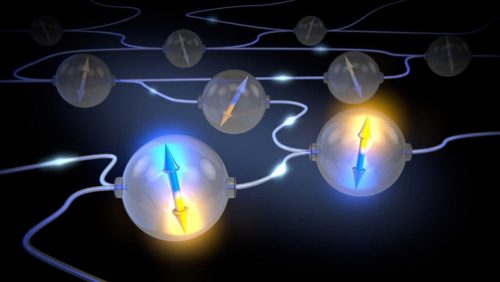A research group from the School of Engineering and Computer Science at the Hebrew University, under the guidance of Prof. Amnon Shashua, was able to prove mathematically that methods leading the field of artificial intelligence can help in understanding phenomena in the field of quantum physics, to which there was no access until now

Phenomena in systems that include many quantum particles (tiny particles such as electrons) are one of the hot topics in contemporary physics research, but even the most respected and experienced researchers are unable to get more than a small glimpse into the variety of these phenomena. Due to the enormous number of particles (over a billion billion in one gram of matter) and the multitude of interactions between them, it is very difficult to carry out a simulation that would allow a comprehensive understanding of multi-particle quantum systems. Even the most powerful computer programs struggled to meet this seemingly uncrackable challenge. Up to now.
A new study by a group of doctoral students from the Department of Computer Science at the Hebrew University, Yoav Levin, Or Shair and Nadav Cohen, under the guidance and leadership of Prof. Amnon Shashua, was able to prove mathematically that deep neural networks, algorithms that revolutionized the world of artificial intelligence and enabled the leap in developments in the field, can be are also applied in quantum research. The use of neural networks to study physical systems has been done in recent years, but for the first time it has been proven that the networks that are at the forefront of the field and have enabled computers to display advanced vision and voice recognition capabilities, can bring about a revolution in quantum physics research as well. The article was published in the leading journal Physical Review Letters.
Yoav Levin, PhD student who is a partner in the research team: "The article proves that artificial intelligence algorithms can represent very complicated quantum systems, more efficiently than all existing approaches. This discovery paves the way for a new application of modern artificial intelligence - understanding the quantum nature of the world around us."
Multiparticle quantum physics research is one of the most intriguing and popular fields in physics research today. This is a study that identifies how the elementary particles in nature "group" together and bring about surprising properties in the materials they are composed of, such as electrical conductivity, magnetism, and more. A deep understanding in the field will have a huge impact on all areas of our lives. The more you manage to discover and understand the quantum properties of materials, the closer the next revolutions in the field of computing, energy, transportation - and the range is endless. The connection of artificial intelligence to this field promises fascinating developments in the coming years.

3 תגובות
I read the original articles.
This is a groundbreaking and not superficial idea
This is the beauty of deep networks, you don't need more than a superficial understanding of the material, and many examples..
This publication amuses me a lot: these mathematical researchers, who don't even know the Schrödinger equation, are actually saying: "We tested and saw that the combination between artificial intelligence and a very specific use of the quantum computer's resources - in a very specific way, which we claim is the best, can solve the complicated calculations most that exist in modern physics today - those calculations that theorists try to solve with the introduction of many assumptions and with the introduction of strange parameters (which cannot always be explained as to their validity) during the last 90 years - well, dear physicists, work exactly as we tell you (that is, exactly with the algorithms that we we tested) – and we claim that your research will yield these results for you and solve the most chaotic calculations that the theorists are trying to calculate; We promise you that you will succeed. Trust us. So come on, idiots, we've actually done most of the work for you, so stop being idle and go to work!"... ???